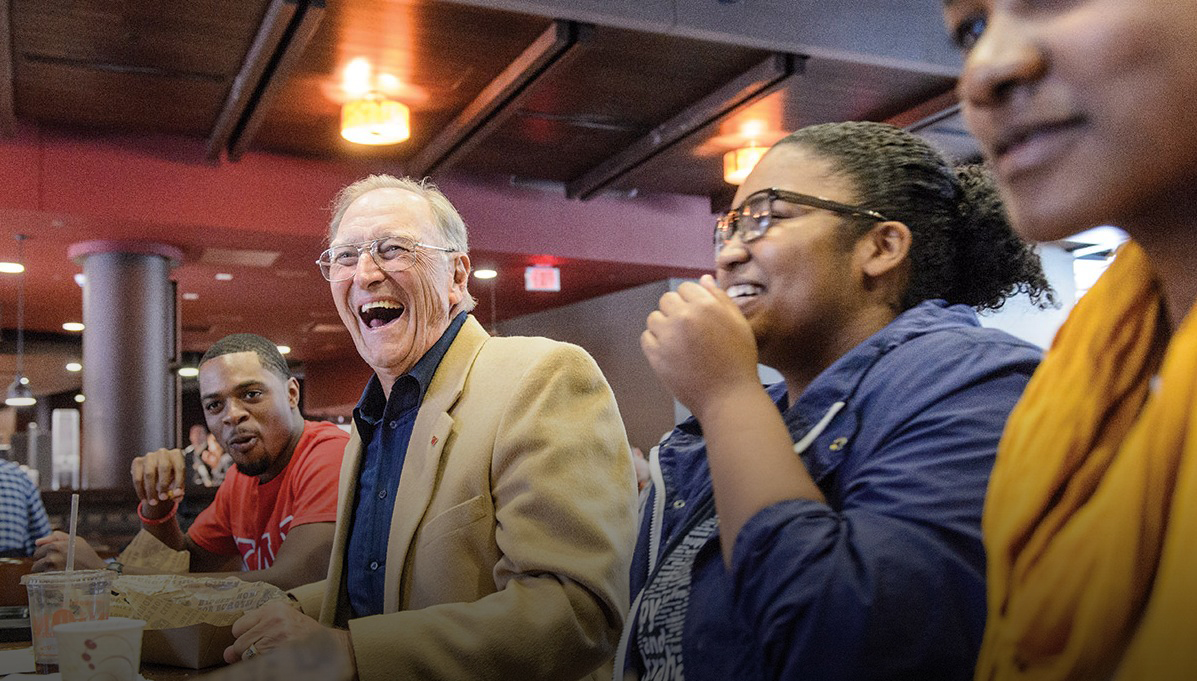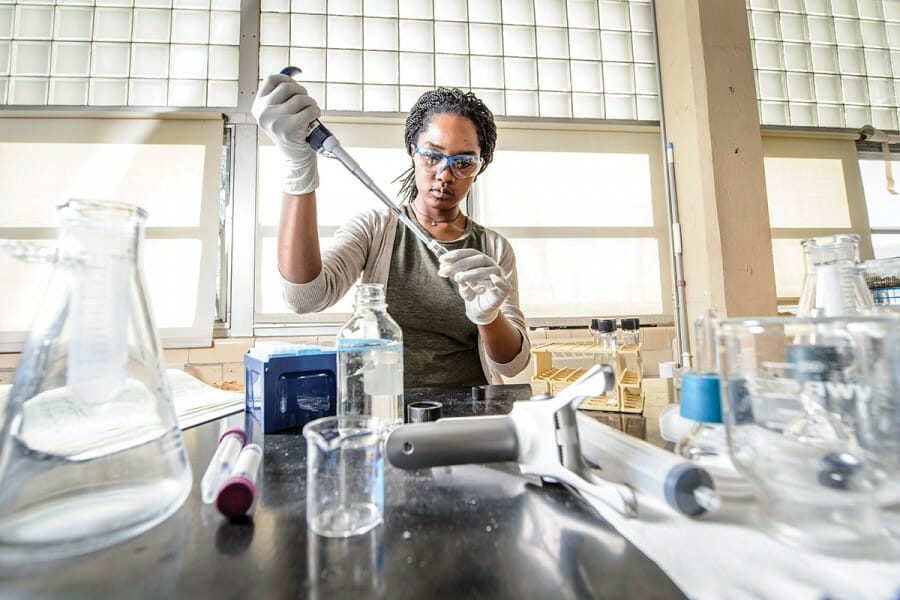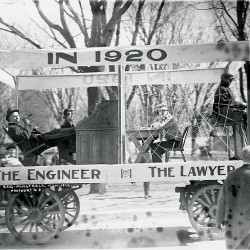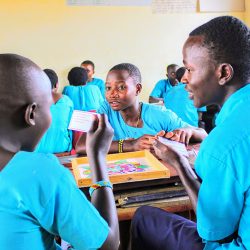
Bridge Builder
As an engineer, Rod Hassett wanted his field to thrive in the face of evolving challenges
After fetching ketchup for fries and plastic utensils, the group settles in for lunch around a table at Union South near the College of Engineering campus. Conversation flows easily as students share updates about how fall semester — now just a few weeks old — is going, which classes are favorites, and how summer internships influenced longer-term plans. The chatter is frequently punctuated by laughter.
You’d never guess that the meal’s host attended college several decades earlier than these students, or that he did so under significantly different circumstances. He has an admirable way of setting aside differences and coaxing out similarities.
• • •
Rod Hassett ’62 excels at making connections. It’s a skill he has brought to lunch tables and conference room tables since deciding — after a nudge from his father early in his college pursuits — that engineering would be a good fit. Engineers analyze problems and suggest solutions within parameters that include affordability and safety, enthusiastically completing complex puzzles while the rest of us may only see the pieces. These specialized skills came naturally to Hassett throughout his lengthy career at Strand Associates, a Madison engineering firm.
After retiring from Strand in 2002, he called upon his knack for mentorship, joining the UW faculty as an adjunct professor and, for 13 years, teaching the capstone design course, which challenges engineering students to tackle real-life projects.
Along the way, Hassett had been nagged by an industry dilemma that couldn’t be solved with carefully designed bridges constructed of steel and concrete. How could a profession heavily represented by white men adequately address the problems found in a broad range of communities and demographics?
“We have huge engineering problems to solve over the next 50 years,” he says, adding that it’s essential to include a diverse societal representation to solve them.
“Diverse groups are going to make smarter decisions than like-minded groups,” Hassett continues. “Those voices needed to be at the table. And many of the problems that we need solved are in the inner cities. There’s no one better to work with the people in the inner cities than the people who grew up there.”
• • •
Hassett knew exactly where to find young people who could be encouraged to follow in his footsteps from the inner city to UW–Madison’s College of Engineering. He graduated from Rufus King High School in Milwaukee, Wisconsin, in 1958, just prior to the city’s dramatic shift in demographics. From 1960 to 1970, Milwaukee’s African American population increased by 68 percent, due in part to migration from Chicago and the South. At Rufus King, minority enrollment slowly grew, reaching one-third by 1964; today, minorities represent 79 percent of the school’s student body.
Now called Rufus King International, the high school’s nearly 1,500 students take challenging precollege coursework. U.S. News & World Report includes it in the magazine’s rankings of nationally recognized high schools. Eighty-five percent of the 2015 graduating class planned to attend college, with another 10 percent intending to enroll in two-year institutions — a significant change from Hassett’s student days.
“My dad was really pro-education, but he came out of the Depression and World War II, and he didn’t have a lot of formal education,” Hassett says. “I grew up in an area where probably less than half of the kids went to college when they got out of high school, but there was no question I was going to college. Education has always been part of my life.”
As Hassett pondered how to bring more diversity into his field, he talked with Jeff Russell, then chair of civil and environmental engineering and today dean of the Division of Continuing Studies. Together they decided to recruit students to be engineers “like Barry Alvarez recruits football players,” Hassett recalls. He worked with the UW Foundation in 2006 to establish a scholarship program specifically designed to support Rufus King students who had an interest in becoming engineers. He provides scholarships for a student’s first two years, and the College of Engineering supports additional years. So far, 15 Rufus King graduates have been named Hassett Scholars. Nine have graduated from the UW — a track record that makes Hassett especially proud — and are now pursuing careers ranging from jet pilot training with the U.S. Air Force to working as a computer programmer at Google. The other six scholars are currently enrolled.
“The scholarship is a means to solving a problem,” Hassett says. “Now there’s a steady stream of kids coming from King. We’re solving a problem one person at a time.”
• • •
Coty Weathersby x’19 was among the students having lunch with Hassett at The Sett in Union South last fall. Now a fifth-year senior majoring in chemical engineering, Weathersby supplements her course work with time in a campus research lab. Her current research centers on analyzing bacteria in wastewater; during a stint in a UC–Berkeley lab in summer 2017, she explored harmful contaminants in groundwater.
Although she’d been juggling honor societies and athletics at Rufus King and leaning toward majoring in chemistry, Weathersby says her selection as a Hassett Scholar spurred her to change plans. And she marvels at the interest Hassett shows in the students. “I never thought I’d actually get to see the face behind the scholarship,” she says. “When I first received the award, Rod came to the ceremony [at Rufus King]. That in itself was exciting because he got to meet my sisters and my mom.”
She adds, “I remember getting an email from him at the end of my freshman year that said, ‘Congratulations. I’m proud of you!’ ”
“That individual touch is just very, very rare,” says Mary Fitzpatrick, director of the College of Engineering’s Diversity Affairs Office. “Rod offers mentoring as a seasoned professional. I would even say Rod has mentored us. He continues to make sure that we understand the intent and the goals [of his scholarship].”
Hassett Scholars are part of the college’s larger Leaders in Engineering Excellence and Diversity program, which is designed to support populations that are historically underrepresented in the field, including low-income or first-generation students, women, and students of color. The college takes steps to make sure incoming students are aware of scholarships for which they can apply.
“Engineering is very competitive, and the climate of engineering can be harsh at times,” Fitzpatrick says. “Our message is that you all can succeed, and we’re going to help you succeed. Yes, you have to do the work yourself, but you’ve got a net that’s going to work with you.” The diversity office provides a comfortable space where students can come to hang out and talk between classes, hold math study sessions, and gather over a meal.
Brian Núñez, former director of the Engineering Summer Program and now the director of career advising and wellness at the UW’s medical school, remembers the first time he met Weathersby. “She gave me her résumé and said she was going to run a company one day,” he says with a smile.
That company may well be in Weathersby’s future, but in the meantime, she is honing her leadership skills. She serves as the academic excellence chair for the campus chapter of the National Society for Black Engineers, and she attended the organization’s conference during her sophomore year. “I remember walking into the convention hall, and it was filled with so many black engineers and engineers of color, and I thought, ‘Wow.’ I just don’t see that on TV. I don’t see that in the media, so it was great. It’s a reminder in times when I’m struggling … that there are a lot of other engineers who felt the same thing, but they’ve made it.”
She was one of three students who helped start the UW chapter of the National Organization for the Professional Advancement of Black Chemists and Chemical Engineers. The chapter’s members — numbering about 15 undergraduate and graduate students — do volunteer work and sponsor professional development events.
Weathersby’s motivation for involvement in the organizations, she says, is “making sure future Hassett Scholars have these resources.” She attributes “caffeine and time management” — and learning to say no — to her ability to juggle classes, research, student organizations, and tutoring.
“I don’t want to do something and not do it well,” she says.
Weathersby, who is eyeing graduate school to earn a master’s degree and, possibly, a doctorate, expresses admiration for UW faculty members who both teach and conduct research.
But for now, she emphasizes the powerful force of community. That, she believes, has been the greatest gift of all, in some ways eclipsing the financial support. She keeps in close contact with other Hassett Scholars, including those who have graduated.
Hassett makes sure that current students have ongoing support from each other by scheduling lunch sessions twice a year. “I really want to make sure that the older kids, the more senior people, are sharing their experiences with the younger students,” he says. “They can help each other so much.”
• • •
During last October’s lunch conversation, Hassett encourages each student to tell him what’s new. Weathersby describes her summer at UC–Berkeley. Devin Lafford x’19, a computer engineering student, details an internship at a company that designs medical devices. George Akpan x’19 tells the group that he wants to focus on wind power in his career, plans that earn an enthusiastic “Good for you!” from Hassett. Alexus Edwards x’21 says she’s leaning toward the biomedical field and recounts her summer as an intern with the Milwaukee fire department unit based at the airport.
Hassett nods, smiles, and asks more questions, easily sliding into the mentorship role he enjoys. The topic shifts to Park Street, one of the main thoroughfares to the UW campus, and he tells the students, “Here you had this gorgeous campus, but everyone coming there had to go down this ugly street.” He notes that his firm worked on a plan to give the location new life.
“When you do something like this as an engineer, you have a vision,” he says. “I could see that this was going to be the gateway to the campus.
“That’s one thing that’s nice about being an engineer,” he continues. “You get involved in things like that and you put your footprints in the sand. Early on you can see something, you have a vision for something, and you get it done. And then the rest of the world catches up. You just smile and walk on.”
As the scholars grab their backpacks and head off to their next classes or study groups, Hassett calls out, “Good seeing you guys!” With a smile, he adds, “See you in May — you’ll be a lot smarter by then.”
Cindy Foss is a freelance writer and editor based in Madison. She served as co-editor of On Wisconsin for two dozen years.
Published in the Fall 2018 issue




Comments
No comments posted yet.